

10. The George Washington Bridge Gets Lit Up (Occasionally)

Photo by Dark Cyanide
Not commonly known about the George Washington Bridge is that it gets lit up, unannounced, for holidays a few times a year. It’s a smaller-scale program like that on the Empire State Building. Back in February, the towers were lit for President’s Day and the photographer Dark Cyanide shared us these shots he took (while almost floating away on the bed of ice).
9. NYC’s Mr. First Was Also the First to Cross the George Washington Bridge Lower Level
https://www.youtube.com/watch?v=T4bU7BVbjlA Brooklyn-born Omero C. Catan holds a unique title in New York City history. He made it his life goal to be the first to test out some of the city’s technological marvels, including first to ride the Zeppellin, first to skate on the Rockefeller Center ice rink, first person to drive through the Lincoln Tunnel. He was also the first to cross the lower level of the George Washington Bridge in 1962. In a career that began in 1928, Catan has been the first person present at more than 500 historic opening days across the east coast. Read more about Catan here.
8. The George Washington Bridge Was Supposed to be Clad in Granite and Concrete
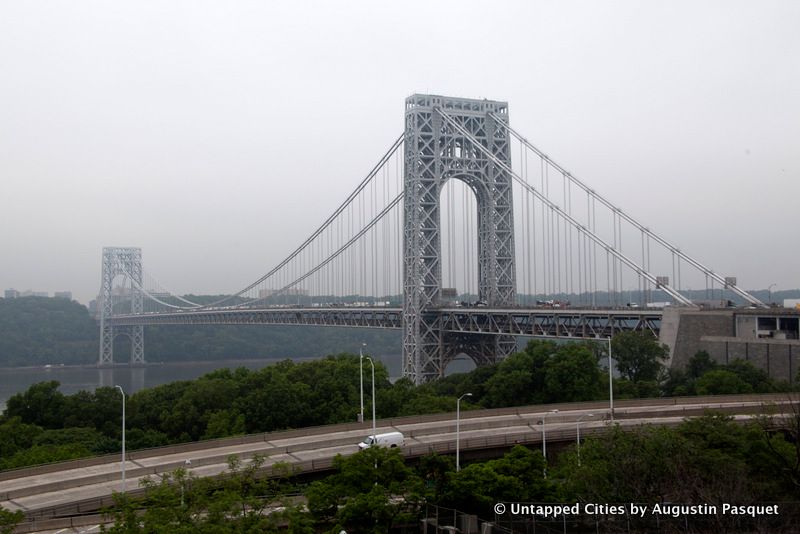
Le Corbusier called the George Washington Bridge “the most beautiful bridge in the world” but its modern allure is a mere accident of time. The bridge’s towers were supposed to be clad in a concrete envelope faced in pink granite chiseled with Beaux Arts flourishes, as well as statuary to cover the points where the barrel cables pass through the roadway on their way to the anchorages. These plans, along with grand plazas for the bridges entrances with heroic statuary and a fountain on the New York side, were dreamt up by Cass Gilbert, who most famously design the Woolworth Building.
According to Le Corbusier, “the towers were to have been faced with stone molded and sculpted in ‘Beaux Arts’ style.…Someone acted…’Stop! No stone or decoration here.’…They dismissed the architect with his decorations.” In truth, ‘twas the depression that killed Gilbert’s design. Read the full story of what happened here.
7. The “Bridge Man” Who Photographed George Washington Bridge From Up Top
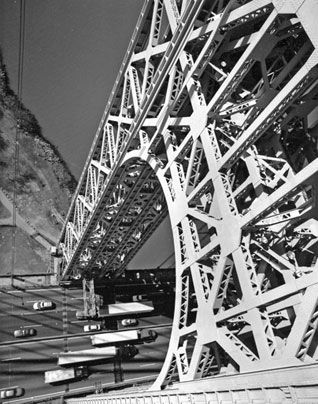
Photo by Dave Frieder
Before 9/11, New Jersey-native Dave Frieder was making it his mission to scale the bridges of New York City. With a working partnership with the New York City D.O.T. over the course of 8 years, he was given access to a view few of us ever see. His bridge series begins in 1993 but his work in photography goes back to the age of 7 including a stint with the Ansel Adams Gallery which he got by cold calling. It was through the Ansel Adam’s circle that he met Othmar Ammann, an engineer on the George Washington Bridge.
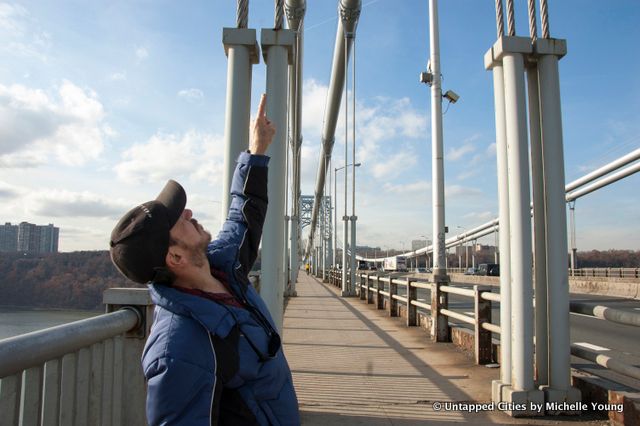
In 2013, we met up with Dave Frieder on the upper level of the George Washington Bridge to talk to him about his feats, which were cut short by security concerns after 9/11. He used the photography to fully understand the bridges themselves, 16 of which he has scaled and photographed in New York City. He says, “for me, being able to ‘Feel The Steel’ was a way of understanding how and why bridges work and function.”
6. The Little Red Lighthouse Wasn’t Originally Beneath the George Washington Bridge

The Little Red Lighthouse and the Great Gray Bridge.
This 1942 children’s booktells the true story of the George Washington Bridge’s overshadowing of the Little Red Lighthouse. But the 1880 lighthouse originally stood on the coast at Sandy Hook, New Jersey. In 1921, it was moved to Jeffrey’s Hook in northern Manhattan to aid ships in the navigation of the rocky and narrow portion of the Hudson. The George Washington Bridge was completed in 1931 and its bright lights completed overtook those of the Little Red Lighthouse. A legion of childrenrallied to save it from destruction, and today, the lighthouse has been restored and relit. Today, it’s run by the New York City Department of Parks and Recreation. You can visit and climb to the top of the tower. Check out 9 historic buildings that have been moved in NYC.
5. Washington Heights’ Drugs Trade in the 80s and 90s Was Tied to Proximity to George Washington Bridge
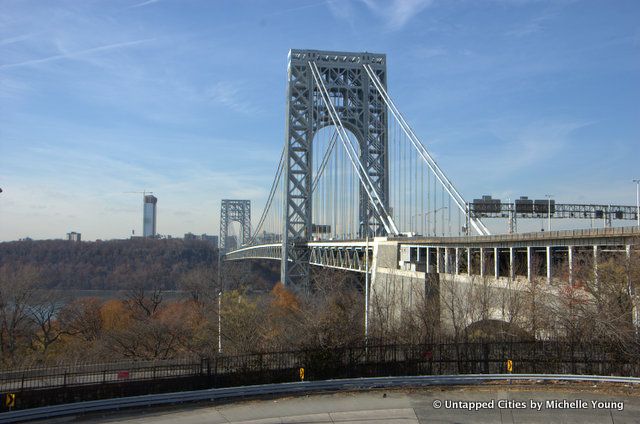
As The New Yorker reported in the 1995 article “Writing Down Secrets,” “From 1990 to 1992, Washington Heights had more homicides than any other neighborhood in New York. Partly because of the area’s proximity to the George Washington Bridge, it has an active–and deadly–drug trade.” The New York Times also wrote, “Partly by accident of geography, Washington Heights became a symbol of the drug crisis in the 1980’s. Access to the highways gave parts of the neighborhood almost the feel of a tourist economy. It is at the nexus of the Cross Bronx Expressway, the Harlem River Drive, the Henry Hudson Parkway and the George Washington Bridge.”
4. There Was a Pedestrian Toll of 5 Cents to Cross the George Washington Bridge
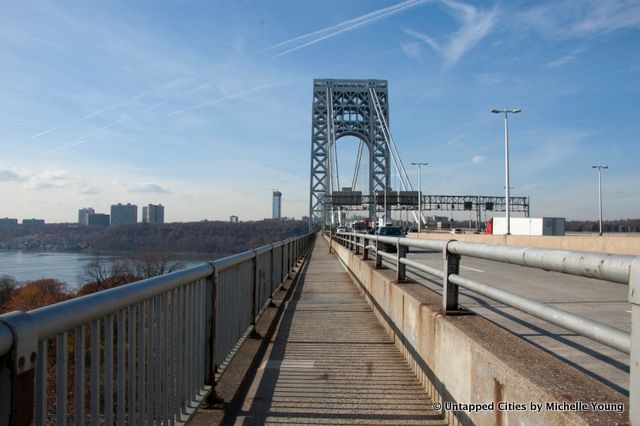
When the George Washington Bridge opened in 1931, there was a pedestrian toll to cross the bridge at $0.10. On the first full day of operation, 20,000 people crossed the bridge by foot while another 10,000 people, discouraged by the fare, watched from Manhattan Plaza.
3 years later, the pedestrian toll was reduced to $0.05 and eliminated in 1940 at the request of Mayor Fiorello LaGuardia and Robert Moses. It’s likely this move was both for the public and for financial reasons: the amount made in pedestrian tolls barely covered the cost of collection.
3. George Washington Bridge Has the World’s Largest Free Flying Flag
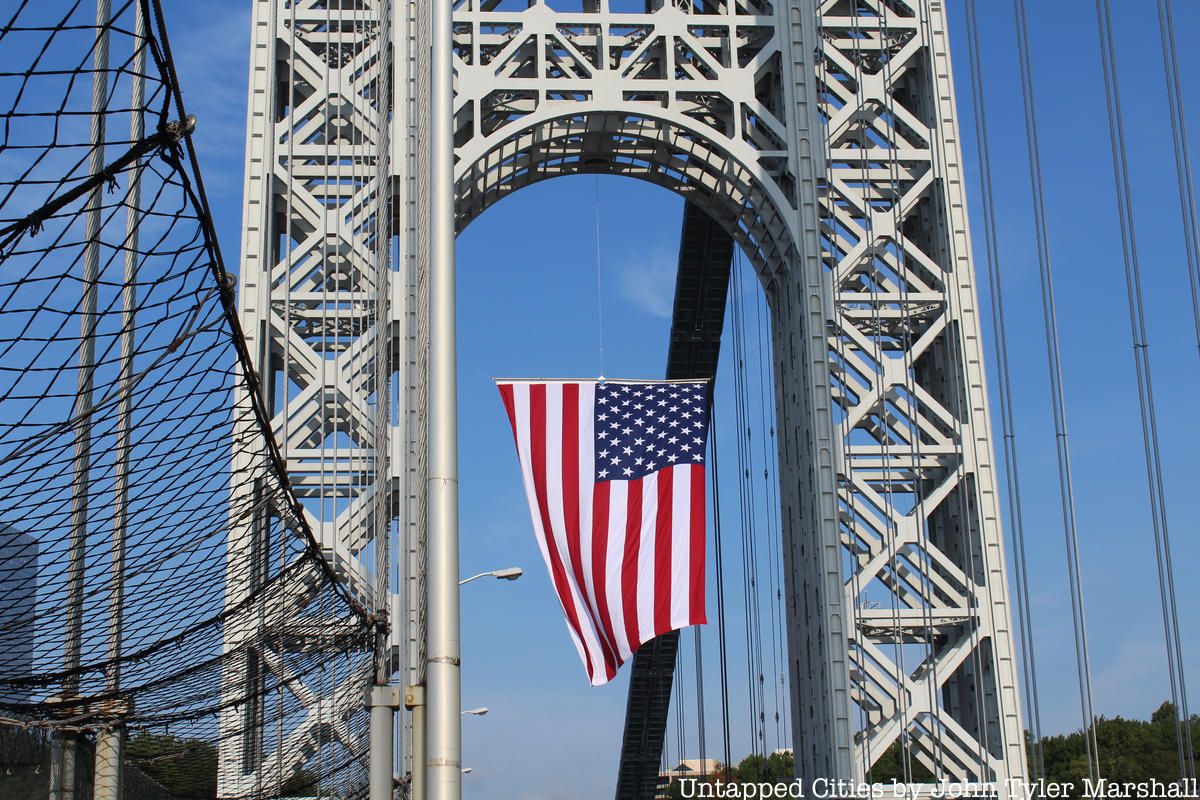
Measuring 90 feet by 60 feet, the flag that is flown under the arch of the George Washington Bridge on major holidays is considered the largest free flying flag in the world. It has been raised on major holidays and is reported to weigh 450 pounds.
2. There Was an Idea to Put a Restaurant at the Top of the George Washington Bridge
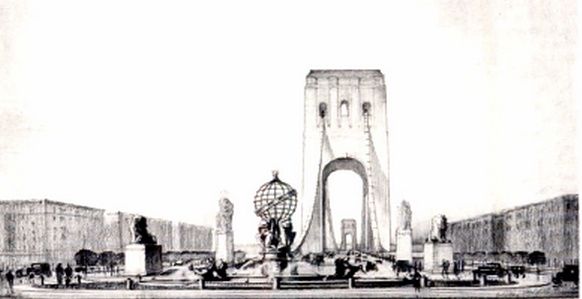
Image via Six Bridges: The Legacy of Othmar H. Ammann by the Office of Cass Gilbert
Those who know New York City well are aware that there was a real craze for rooftop observation decks–from the Chrysler Building, to Empire State Building to Rockefeller Center. For the design of the George Washington Bridge, architect Cass Gilbert left engineer Othmar Ammann mostly to his own devices, but Gilbert did urge him to include elevators to the tops of the towers in order to utilize them as observation decks. In one set of drawings, Gilbert placed a restaurant with a boat drop-off in the New York tower.
1. A Horse Was One of the First to Cross the George Washington Bridge
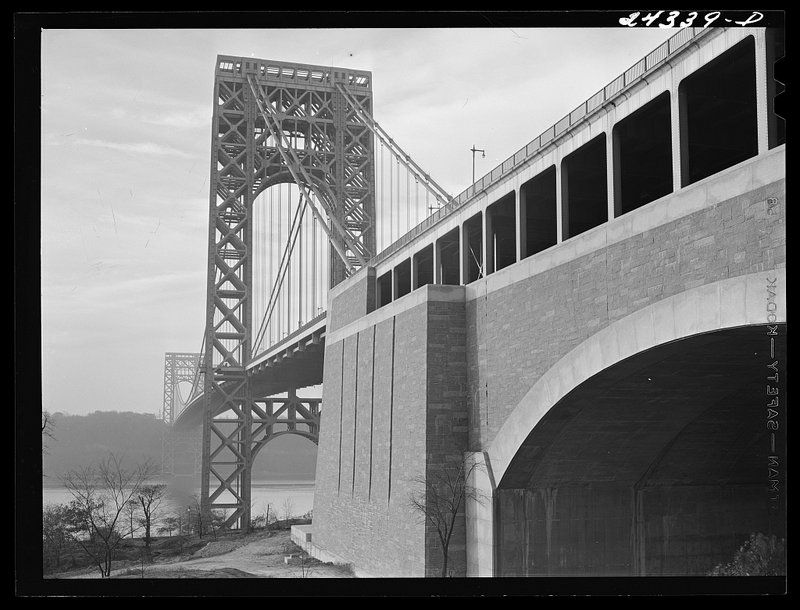 Photo via Library of Congress by Arthur Rothstein
Photo via Library of Congress by Arthur Rothstein
Besides the 55,523 vehicles and 33,540 pedestrians that crossed the bridge, a man from 73rd Street named Martin Solomon crossed with his horse, named Rubio. Martin Solomon of 23 W 73rd Street in Manhattan crossed the bridge. He paid the 25 cent toll for him and his horse, Rubio. On the 50th anniversary of the George Washington Bridge in 1980, Soloman said, “The bridge holds very fond memories for me, for I was a young man then. Give me a horse and I’ll try it again.” Next, read about the Top 10 Secrets of the Lincoln Tunnel. Get in touch with the author @untappedmich. This article also written by Benjamin Waldman and Jinwoo Chong.


